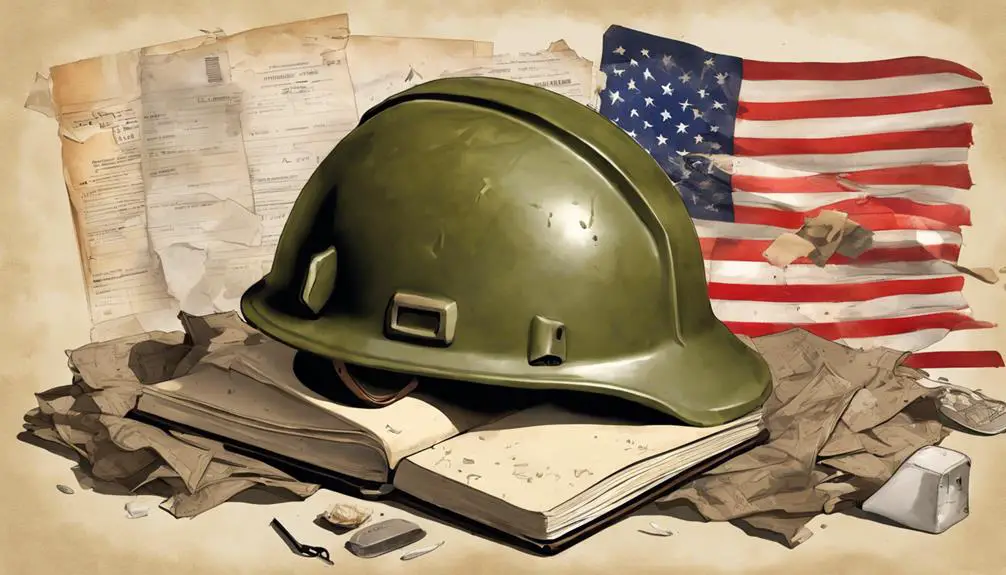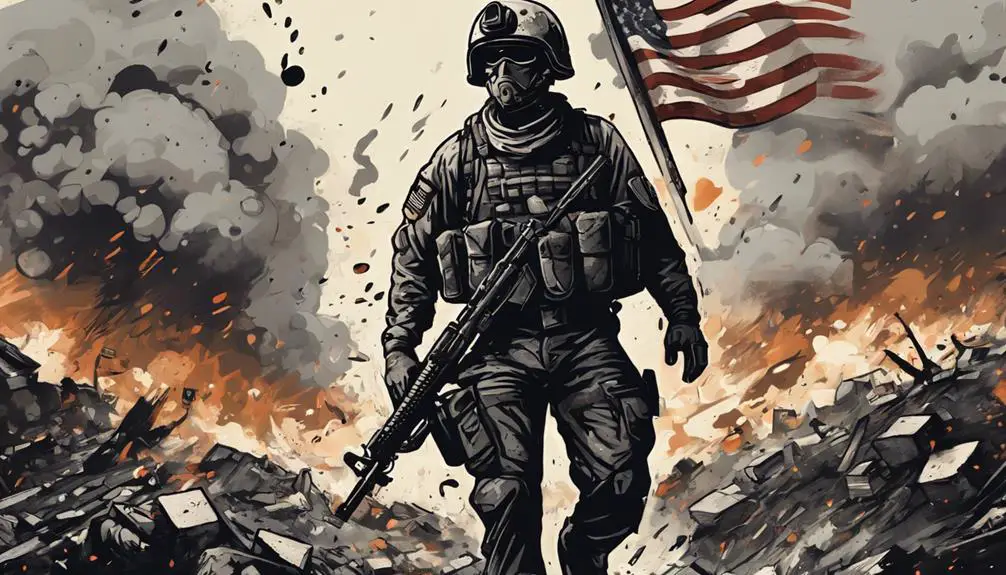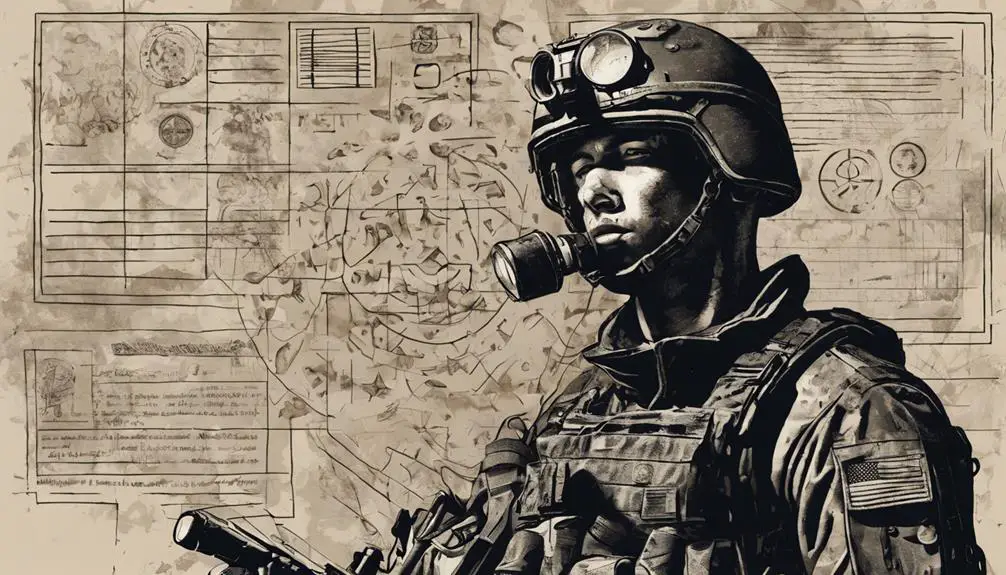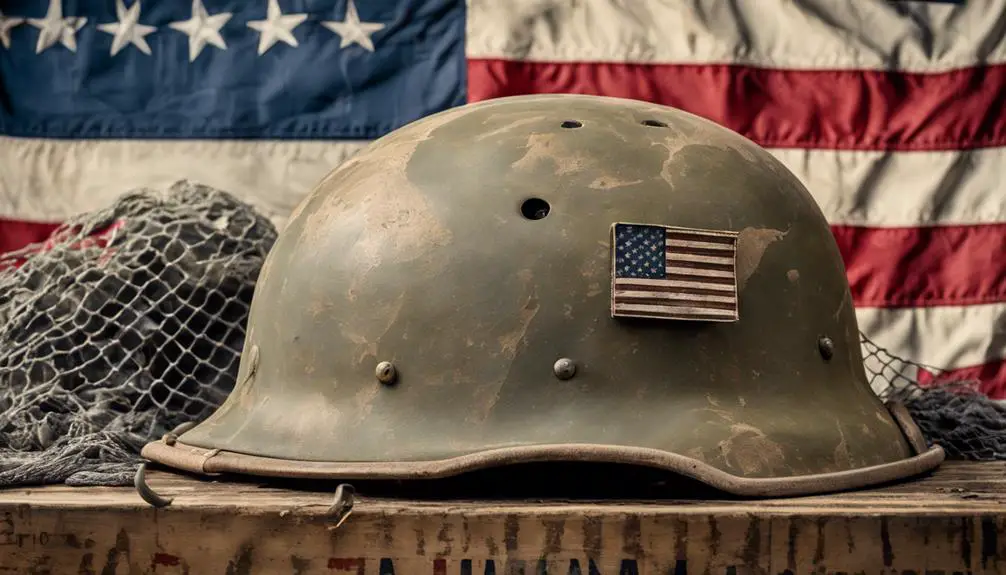You're about to uncover the secretive language of 0311 military slang, shaped by centuries of military history and culture. This unique language has been passed down through generations of Marines, with roots tracing back to World War I. You'll discover phrases for field operations like "SITREP" for updates and "ROE" for rules of engagement. Combat culture expressions like "Embrace the suck" reflect theBattle Mindset of resilience. Get ready to learn more about the mission-critical lingo that promotes unity, teamwork, and discipline – and prepare to gain a deeper understanding of the 0311 brotherhood of warriors.
Declassified: 0311 Slang Essentials

Delving into the world of military slang, you'll quickly discover that 0311, the Marine Corps' infantry occupational specialty code, has its own unique language. This specialized vocabulary has been shaped by military history, with roots tracing back to World War I. The term 'grunt,' for instance, originated from the sound Marines made while hauling heavy packs during the Vietnam War.
Understanding the origins of 0311 slang is vital to grasping its significance. Military history has played a significant role in shaping this language, with each conflict influencing the terminology used. From 'foxhole' (a defensive trench) to 'hooah' (an expression of enthusiasm), each term has its own story. The slang has been passed down through generations of Marines, serving as a badge of honor and a symbol of camaraderie.
As you explore the world of 0311 slang, you'll uncover a rich tapestry of military history, cultural nuances, and shared experiences. By grasping the origins and evolution of this unique language, you'll gain a deeper appreciation for the Marine Corps' infantry culture.
Phrases for Field Operations
When you're in the thick of field operations, you'll rely on a distinct set of phrases to convey critical information quickly and efficiently to your team. In the heat of the moment, every second counts, and using the right terminology can mean the difference between success and failure.
That's where Tactical Comms come in – a specialized language designed to facilitate rapid communication in high-stress environments.
In the field, you'll need to be familiar with Field Jargon like 'SITREP' (situation report) to provide real-time updates on the mission's progress. You'll also use phrases like 'ROE' (rules of engagement) to clarify the boundaries of acceptable behavior. Other essential phrases include 'H-Hour' (the designated start time of an operation) and 'EOM' (end of message), which helps to signal the conclusion of a transmission.
Combat Culture Expressions

You'll encounter a unique set of expressions in combat culture that reflect the distinct values and attitudes of military personnel, from 'Oorah' (a Marine Corps battle cry) to 'Hooah' (an Army expression of enthusiasm and approval).
These expressions are deeply rooted in the Battle Mindset, where warriors embody a strong sense of resilience, adaptability, and courage. In this culture, you'll hear phrases like 'Embrace the suck' (accepting and overcoming challenges) and 'Honor, Courage, Commitment' (the Marine Corps motto).
These expressions not only reflect the Warrior Identity but also instill a sense of pride, loyalty, and camaraderie among service members. You'll notice that combat culture expressions often emphasize the importance of teamwork, sacrifice, and discipline.
Slang for Squad Dynamics
In the tight-knit world of squad dynamics, military slang like 'buddy check' and 'got your six' reinforces the bonds of trust and loyalty that keep teammates alive on the battlefield.
As you work together with your squad, you'll hear phrases that promote unity and teamwork. These expressions are vital in building strong relationships, which are essential for high team morale.
Here are some examples of military slang that foster strong squad dynamics:
- Battle Buddies: Your closest comrades, who've your back no matter what.
- Got Your Six: Having someone's back, watching out for their safety.
- Buddy Check: A routine check-in to ensure your teammates are okay.
- Team Morale: The overall spirit and motivation of your squad, which affects performance and cohesion.
These expressions remind you that you're part of a larger unit, working together towards a common goal.
Mission-Critical Lingo Decoded

During high-stakes operations, understanding mission-critical lingo is essential to ensuring seamless communication and avoiding costly misunderstandings. You can't afford to misinterpret important information, and that's where mission-critical lingo comes in. This specialized language is designed to convey complex information quickly and accurately, reducing the risk of errors.
Throughout history, military forces have relied on coded languages to convey sensitive information. The famous Code Talkers, for instance, used Native American languages to create unbreakable codes during World War II. Today, lingo evolution continues to play a critical role in military communications. You'll hear terms like 'sitrep' (situation report) and 'CAS' (close air support) used to convey vital information quickly.
Understanding mission-critical lingo is essential for effective communication in high-pressure situations. By familiarizing yourself with these specialized terms, you'll be better equipped to respond to complex situations and make informed decisions.
Frequently Asked Questions
Is Military Slang Only Used in the US Military?
You might think that military slang is exclusive to the US military, but that's not the case. In reality, military slang is used globally, with international applications in various armed forces.
Cross-cultural comparisons reveal that military slang serves a universal purpose – to create a sense of camaraderie and shared experience among troops.
From the UK's 'squaddie' to Australia's 'digger,' military slang is a widespread phenomenon that transcends national borders.
Can Civilians Use Military Slang in Everyday Conversation?
You might think that using military slang in everyday conversation is off-limits, but it's not necessarily a no-go.
However, you should be aware of the potential pitfalls. Using cultural references without understanding their context can be seen as appropriation.
Additionally, a language barrier can arise if your conversation partner isn't familiar with the terms.
If you're mindful of these issues, go ahead and throw in some 'ops' or 'situational awareness' – just be prepared to explain what you mean!
Are There Regional Differences in Military Slang Usage?
When you travel across the country, you notice regional differences in language. You'll pick up on distinct accents and dialects, like Coastal dialects or Southern drawls.
Similarly, military slang usage varies by region. You'll find that different bases, units, and branches develop their own unique slang. For instance, Naval bases on the East Coast might use different terms than those on the West Coast.
These regional differences are shaped by local culture, history, and demographics.
How Does Military Slang Evolve Over Time?
You might wonder how language evolves over time. In reality, linguistic adaptation drives language change. As cultural shifts occur, words and phrases fall in and out of favor.
New generations introduce novel expressions, while outdated terms fade away. This natural process shapes the language, making it more relatable and efficient.
In the context of military slang, this evolution is accelerated by the unique cultural dynamics within the military community, where lingo adapts rapidly to suit their distinct experiences and needs.
Is Military Slang Officially Recognized by the Military?
You might wonder if certain phrases or terms are officially recognized by the military. The answer is, it depends.
While there isn't a formal classification system for slang, some terms do make it into official documentation, like military manuals or training materials.
However, most slang remains unofficial, used informally among service members.
Conclusion
You've cracked the code, earning your stripes in 0311 slang. Now, you're part of an elite group, fluent in the language of the battlefield.
The phrases, expressions, and lingo you've learned are more than just words – they're keys to revealing camaraderie, trust, and success in high-stakes missions.
As you deploy this knowledge, remember that in the trenches, every word counts, and with 0311 slang, you're armed and prepared for victory.







